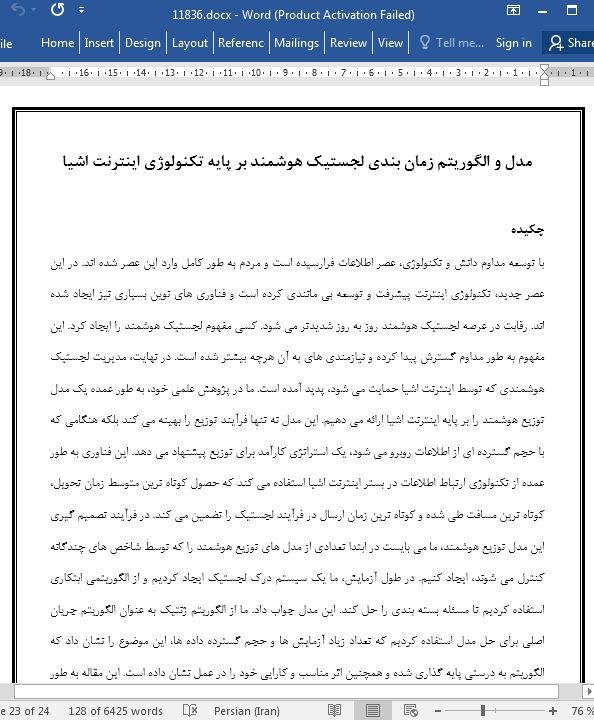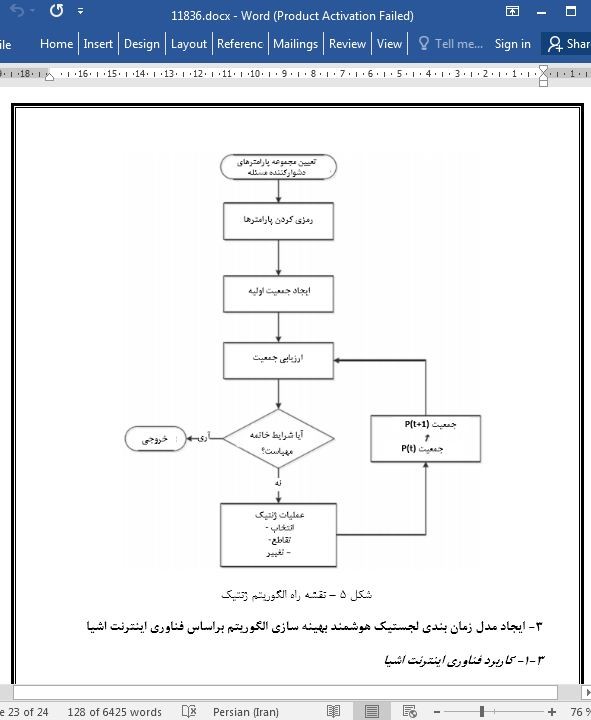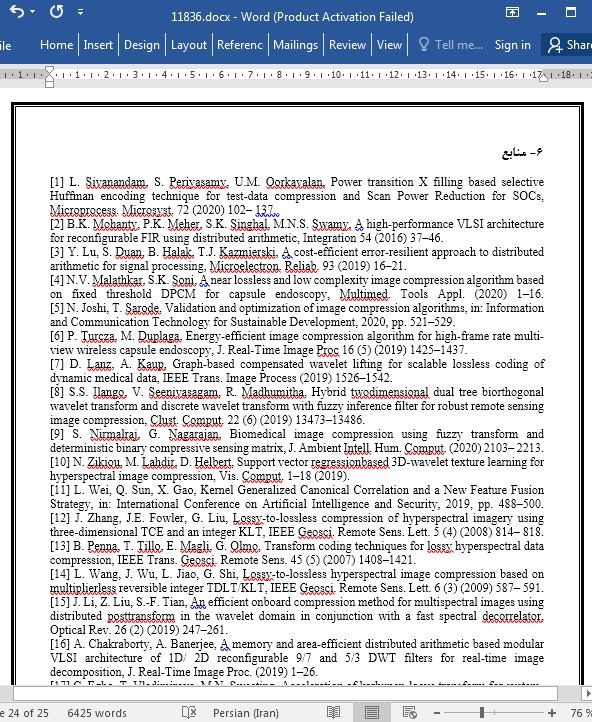
مدل و الگوریتم زمان بندی لجستیک هوشمند بر پایه تکنولوژی اینترنت اشیا
چکیده
با توسعه مداوم دانش و تکنولوژی، عصر اطلاعات فرارسیده است و مردم به طور کامل وارد این عصر شده اند. در این عصر جدید، تکنولوژی اینترنت پیشرفت و توسعه بی مانندی کرده است و فناوری های نوین بسیاری نیز ایجاد شده اند. رقابت در عرصه لجستیک هوشمند روز به روز شدیدتر می شود. کسی مفهوم لجستیک هوشمند را ایجاد کرد. این مفهوم به طور مداوم گسترش پیدا کرده و نیازمندی های به آن هرچه بیشتر شده است. در نهایت، مدیریت لجستیک هوشمندی که توسط اینترنت اشیا حمایت می شود، پدید آمده است. ما در پژوهش علمی خود، به طور عمده یک مدل توزیع هوشمند را بر پایه اینترنت اشیا ارائه می دهیم. این مدل نه تنها فرآیند توزیع را بهینه می کند بلکه هنگامی که با حجم گسترده ای از اطلاعات روبرو می شود، یک استراتژی کارآمد برای توزیع پیشنهاد می دهد. این فناوری به طور عمده از تکنولوژی ارتباط اطلاعات در بستر اینترنت اشیا استفاده می کند که حصول کوتاه ترین متوسط زمان تحویل، کوتاه ترین مسافت طی شده و کوتاه ترین زمان ارسال در فرآیند لجستیک را تضمین می کند. در فرآیند تصمیم گیری این مدل توزیع هوشمند، ما می بایست در ابتدا تعدادی از مدل های توزیع هوشمند را که توسط شاخص های چندگانه کنترل می شوند، ایجاد کنیم. در طول آزمایش، ما یک سیستم درک لجستیک ایجاد کردیم و از الگوریتمی ابتکاری استفاده کردیم تا مسئله بسته بندی را حل کند. این مدل جواب داد. ما از الگوریتم ژنتیک به عنوان الگوریتم جریان اصلی برای حل مدل استفاده کردیم که تعداد زیاد آزمایش ها و حجم گسترده داده ها، این موضوع را نشان داد که الگوریتم به درستی پایه گذاری شده و همچنین اثر مناسب و کارایی خود را در عمل نشان داده است. این مقاله به طور عمده اثر سیستم لجستیک هوشمند را که توسط اینترنت اشیا ایجاد شده است تحلیل کرده و سپس به روند توسعه های آتی این سیستم، می پردازد. ما امیدواریم که با تجزیه و تحلیل وضعیت موجود، بتوانیم توسعه بیشتر فناوری اینترنت اشیا در کشورمان و همچنین توسعه و بهینه سازی فناوری سیستم های لجستیک هوشمند را ارتقا دهیم.
5- نتیجه گیری
تاریخ توسعه اینترنت کشور من نسبتاً کوتاه و هنوز در ابتدای دوران خویش است. هنوز بسیاری کمبود در این فناوری هست و نیاز است که بیشتر بهبود داده شود. با توسعه مداوم دانش و فناوری، تکنولوژی اینترنت اشیا هنوز نوآورانه است و همه کشورهای جهان توجه ویژه ای به آن دارند. این تکنولوژی در مدیریت لجستیک هوشمند اعمال شده است که موجب توسعه مداوم صنعت لجستیک گشته است. این تکنولوژی به توسعه و بلوغ خود ادامه خواهد داد و مدیریت هوشمند در سایر زمینه ها نیز درک خواهد شد. استفاده از فناوری اینترنت اشیا به عنوان پایه بهبود مدیریت لجستیک هوشمند، نه تنها می تواند یک تصویر مشارکتی خوب ایجاد کند، بلکه رقابت شرکت را زیاد کرده و شرکت را حرفه ای تر می کند.
Abstract
With the continuous development of science and technology, the information age has arrived, and people have fully entered the information age. In this new era, Internet technology has achieved unprecedented development, and many innovative technologies have also been proposed. The competition in the logistics industry is becoming more and more fierce. Someone proposed the concept of intelligent logistics. This concept has been continuously expanded and the requirements have become higher and higher. Finally, an intelligent logistics management supported by the Internet of Things technology has emerged. technology. In our school’s research, we mainly proposed an intelligent distribution model based on the Internet of Things. This model not only optimizes the distribution process, but also proposes an efficient distribution strategy when faced with a large amount of data. This technology mainly uses the information interaction technology in the Internet of Things, which can ensure that the average delivery speed is the fastest, the average transportation distance is the shortest, and the time consumed in the logistics transmission process is the shortest. In the decision-making process of this intelligent distribution model, we must first establish some intelligent distribution models controlled by multiple indicators. During the experiment, we built a logistics perception system and used heuristic algorithms to solve the packing problem. Answered. The mainstream solution algorithm we use genetic algorithm, a large number of experiments and data show that this algorithm is scientifically based, and it has also exerted its due effect in application. This article mainly analyzes the impact of the intelligent logistics system provided by the Internet of Things technology, and then looks forward to the future development trend of the system. We hope that through the analysis of the status quo, we can promote the further development of my country’s Internet of Things technology, and also promote the further development and optimization of my country’s intelligent logistics system technology.
5. Conclusion
The history of my country’s Internet technology development is relatively short, and it is still in its infancy. There are still many shortcomings in this technology, and it needs to be further improved. With the continuous development of science and technology, the Internet of Things technology is also constantly innovating, and all countries in the world attach great importance to this technology. This technology has been applied to intelligent logistics management, which has promoted the continuous development of the logistics industry. Such technology will continue to develop and mature, and intelligent management can also be realized in other fields. Using the Internet of Things technology as the basis to improve the level of intelligent logistics management can not only establish a good corporate image, but also enhance the competitiveness of the company, and it can also make the company more professional.
چکیده
1- مقدمه
2- کارهای مربوطه
3- ایجاد مدل زمان بندی لجستیک هوشمند بهینه سازی الگوریتم براساس فناوری اینترنت اشیا
1-3- کاربرد فناوری اینترنت اشیا
2-3- ساختار مدل زمان بندی لجستیک هوشمند و بهینه سازی الگوریتم
4- استراتژی زمان بندی لجستیک هوشمند براساس فناوری اینترنت اشیا
1-4- اثر فناوری IoT بر لجستیک هوشمند
2-4- مدیریت ریسک لجستیک هوشمند و استراتژی های کنترل
5- نتیجه گیری
6- منابع
Abstract
Keywords
1. Introduction
2. Related work
3. Intelligent logistics scheduling model construction and algorithm optimization based on Internet of Things technology
3.1. Application of Internet of Things technology
3.2. Intelligent logistics scheduling model construction and algorithm optimization
4. Intelligent logistics scheduling strategy based on Internet of Things technology
4.1. The impact of IoT technology on smart logistics
4.2. Smart logistics risk management and control strategies
5. Conclusion
References
- اصل مقاله انگلیسی با فرمت ورد (word) با قابلیت ویرایش
- ترجمه فارسی مقاله با فرمت ورد (word) با قابلیت ویرایش، بدون آرم سایت ای ترجمه
- ترجمه فارسی مقاله با فرمت pdf، بدون آرم سایت ای ترجمه



